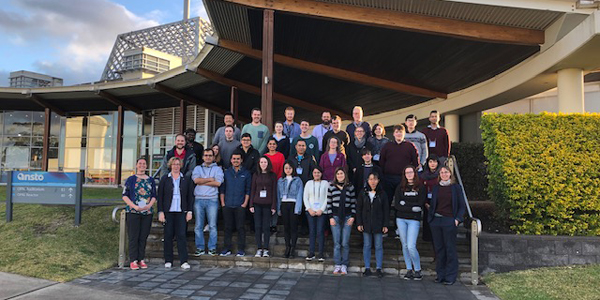Traditional HZB Neutron School will be continued at ANSTO in Australia

The neutron school at ANSTO in cooperation with HZB experts could transfer knowledge and skills in neutron research. © ANSTO
This summer, researchers at the Australian neutron source ACNS organised a joint neutron school at Australia's Nuclear Science and Technology Organisation ANSTO. The HZB-ANSTO neutron school will take place every two years.
The first joint HZB-ANSTO neutron school took place from 23 to 28 June 2019 at ANSTO. HZB experts Prof. Dr. Bella Lake and Prof. Dr. Susan Schorr held several lectures. The interest in the neutron school was high, 24 participants were selected from 60 applications. In addition to lectures, hands on trainings on three instruments of the neutron source ACNS at ANSTO have been offered.
“Certainly we were inspired by the all-encompassing nature of the Berlin school - I believe that our plan going forward would be to run a 'general' neutron school every two years and a more specific school in between," said Dr. Helen Maynard-Casely, one of the organisers at ANSTO.
Shortly before the start of the neutron school, the SPATZ neutron reflectometer at ACNS was inaugurated. SPATZ, formerly known as BioRef at the BER II at HZB, is ideally suited for studies of soft matter in biomedicine, energy and materials. It was donated by HZB to ANSTO since the BER II neutron source will be shut down end of 2019.
In a short video, ANSTO presents SPATZ and its virtues.
arö
https://www.helmholtz-berlin.de/pubbin/news_seite?nid=20628;sprache=en
- Copy link
-
The twisted nanotubes that tell a story
In collaboration with scientists in Germany, EPFL researchers have demonstrated that the spiral geometry of tiny, twisted magnetic tubes can be leveraged to transmit data based on quasiparticles called magnons, rather than electrons.
-
Bright prospects for tin perovskite solar cells
Perovskite solar cells are widely regarded as the next generation photovoltaic technology. However, they are not yet stable enough in the long term for widespread commercial use. One reason for this is migrating ions, which cause degradation of the semiconducting material over time. A team from HZB and the University of Potsdam has now investigated the ion density in four different, widely used perovskite compounds and discovered significant differences. Tin perovskite semiconductors produced with an alternative solvent had a particular low ion density — only one tenth that of lead perovskite semiconductors. This suggests that tin-based perovskites could be used to make solar cells that are not only really environmentally friendly but also very stable.
-
Synchrotron radiation sources: toolboxes for quantum technologies
Synchrotron radiation sources generate highly brilliant light pulses, ranging from infrared to hard X-rays, which can be used to gain deep insights into complex materials. An international team has now published an overview on synchrotron methods for the further development of quantum materials and technologies in the journal Advanced Functional Materials: Using concrete examples, they show how these unique tools can help to unlock the potential of quantum technologies such as quantum computing, overcome production barriers and pave the way for future breakthroughs.
